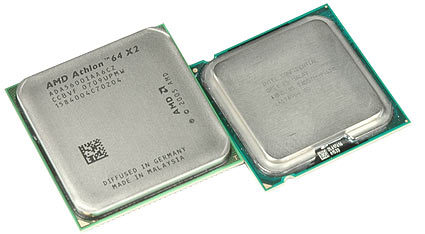Current Mainstream CPU Lineups
Get Tom's Hardware's best news and in-depth reviews, straight to your inbox.
You are now subscribed
Your newsletter sign-up was successful
High-End Fell Below $200
If you're looking to buy a new system or a new processor, then you've come to the right place. A lot has been going on in the market, though Core 2 Duo is still a good choice, and AMD still has no technology to fight back. Its quad-core processor called Phenom is positioned to be a show-stopper - we will see. Then again, we've seen substantial price cuts that put even high-end processors at prices below $200. It's time to have another look around.
Intel's Core 2 Duo processor has been dominating benchmark results ever since its launch in the summer of 2006. Thanks to a large, shared L2 cache for both processor cores, modern 65 nm manufacturing, and the more advanced processor architecture, not even the top model 3.0 GHz AMD Athlon 64 X2 has a chance of winning many benchmarks. However, this applies purely to raw performance.
From the standpoint of performance per watt of power consumed, the Core 2 Duo may look better too, as all processors are rated at a maximum of 65 W, while AMD still has 89 W models. The Core 2 Duo, though, doesn't carry an integrated DDR2 memory controller, which is an integral part of every AMD64 processor and thus increases their power consumption. Even so, AMD doesn't look bad - if you compare entire platforms, Intel doesn't necessarily win the power race as well. Finally, there have been substantial price cuts both in the AMD and in the Intel camp, which has actively reshuffled the balance of power - and created confusion at the same time.
AMD's first quarter results were not very amusing for the firm, as it lost considerable market share and had to post losses. While the acquisition of ATI wasn't quite a bargain, the important issue is processor prices, which were almost cut in half in the firm's attempt to stay competitive. The result is obvious now: AMD may be able to sustain its weakened market share with its Athlon 64 processors, but it isn't making a lot of money.
You will find the latest processor prices at www.amd.com/pricing. A link to Intel's pricelist didn't work, so we recommend using the prices of a recent TG Daily article for the sake of comparison. Even after the latest price cuts, the Core 2 Duo E6700 (2.66 GHz) is tagged at $316. This is 30% more expensive than what AMD asks for the Athlon 64 X2 6000+ top model (3.0 GHz), which is priced at $241. The Core 2 Duo E6600 is indeed faster, but the percentage difference is in the single-digit range.
Taking into account the recent price cuts and looking back at how much processor performance has increased since the introduction of dual core CPUs, we clearly recommend against spending a lot of money on a CPU. You will spend at least double the money on a quad core processor versus a dual core, and many applications still don't benefit from the additional cores. At the same time, having a dual core versus a single core CPU is more important than fighting over a few hundred megahertz. The existing quad core products (Core 2 Quad) will be replaced by next-generation products in the third quarter of 2007.
Join our discussion on this topic
Get Tom's Hardware's best news and in-depth reviews, straight to your inbox.
Current page: High-End Fell Below $200
Next Page The Performance King: Intel Core 2 Duo
Patrick Schmid was the editor-in-chief for Tom's Hardware from 2005 to 2006. He wrote numerous articles on a wide range of hardware topics, including storage, CPUs, and system builds.
